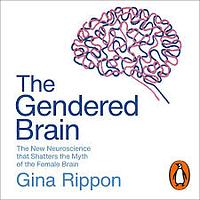Take a photo of a barcode or cover
227 reviews for:
The Gendered Brain: The New Neuroscience That Shatters the Myth of the Female Brain
Gina Rippon
227 reviews for:
The Gendered Brain: The New Neuroscience That Shatters the Myth of the Female Brain
Gina Rippon
informative
slow-paced
This was a really interesting and fascinating book! I really enjoyed the topic and it was really enlightening to see how much socialisation impact the brain! Rippon handled debunking the myths of the gendered brain very well, and there were even some funny moments as well! It was quite a tough read due to all of the language and the psychological terms to take in, but it was worth it!
informative
medium-paced
medium-paced
informative
slow-paced
funny
informative
reflective
medium-paced
I read this book for a university class. It was very well written, and while I don't agree with every point made, I think that the basis is solid and the book is both informative and engaging at the same time.
I thought this book was interesting, if a bit dry. However I don’t think she talked about trans issues in a helpful way.
informative
reflective
I have to admit being a bit disappointed in this book, though I think most of it wasn't the author's fault, so much as the field she's talking about. I'd previously read Cordelia Fine's [b:Delusions of Gender: How Our Minds, Society, and Neurosexism Create Difference|8031168|Delusions of Gender How Our Minds, Society, and Neurosexism Create Difference|Cordelia Fine|https://i.gr-assets.com/images/S/compressed.photo.goodreads.com/books/1348833681l/8031168._SY75_.jpg|12635310]. But (to the best of my recollection of that back) in the almost a decade between when that was released and this book's release, the state of research into gender hasn't changed all that much.
This book exists to debunk an awful lot of bad science of biological sex and neuroscience. She describes the field as a game of Whac-A-Mole--every time some idea is proved to be bogus, someone brings it back up. Even though what few differences are found between the brains of males and of females, as an aggregate, have found to be minimal (small differences between the averages, with a great deal of overlap), and even though we know more and more about how it is possible or probably that brain plasticity (the ability of brains to change in response to experience) does more to drive gender difference than biology, scientists keep looking for ways that males and females have different brains caused by biology.
Part of the problem is that, as the field is currently set up, any finding that some feature of the brain shows no difference between males and females is considered a negative result, and negative results don't typically get published. But shouldn't these be positive results, because we're finding out that, actually, males and females have similar, or effectively the same, brains, at least as far as genetics is concerned?
Even more, I'd rather hoped that in the past almost a decade, scientists would have done more to understand how much influence society has in creating gender differences in the brain. But this and related avenues (I was really hoping hear something, anything about trans/non-binary brains) are something that Rippon can only suggest be studied for the future.
I might have liked Rippon to explain what her instinct is, her hypotheses. Clearly she thinks plasticity and societal programming are likely to have a role greater than genetics, but that only really comes up to say that the scientific studies she's reviewing don't actually say as much about biology and gender as their author's think they do. But I wanted more, some hint about what's actually going on. I guess I understand why she doesn't, since her whole book is spent taking down those who overreach beyond the evidence. And maybe that's just not the point of this book.
That all said, I didn't feel like Rippon is as good a science communicator as she could be (at least not when it comes to writing books) . Though I'm sure this book is considerably easier to read than scientific papers, it's still not that friendly to a lay audience. I think a lot of the details of studies could have been left out, or at least put in the endnotes (instead the endnotes are only plain citations).
I also had a few issues on the rare occasions that trans and non-binary people came up--the use of the term 'transsexuals' in this day and age was cringe enducing--though all in all the author seems sympathetic, just not well aware.
This book exists to debunk an awful lot of bad science of biological sex and neuroscience. She describes the field as a game of Whac-A-Mole--every time some idea is proved to be bogus, someone brings it back up. Even though what few differences are found between the brains of males and of females, as an aggregate, have found to be minimal (small differences between the averages, with a great deal of overlap), and even though we know more and more about how it is possible or probably that brain plasticity (the ability of brains to change in response to experience) does more to drive gender difference than biology, scientists keep looking for ways that males and females have different brains caused by biology.
Part of the problem is that, as the field is currently set up, any finding that some feature of the brain shows no difference between males and females is considered a negative result, and negative results don't typically get published. But shouldn't these be positive results, because we're finding out that, actually, males and females have similar, or effectively the same, brains, at least as far as genetics is concerned?
Even more, I'd rather hoped that in the past almost a decade, scientists would have done more to understand how much influence society has in creating gender differences in the brain. But this and related avenues (I was really hoping hear something, anything about trans/non-binary brains) are something that Rippon can only suggest be studied for the future.
I might have liked Rippon to explain what her instinct is, her hypotheses. Clearly she thinks plasticity and societal programming are likely to have a role greater than genetics, but that only really comes up to say that the scientific studies she's reviewing don't actually say as much about biology and gender as their author's think they do. But I wanted more, some hint about what's actually going on. I guess I understand why she doesn't, since her whole book is spent taking down those who overreach beyond the evidence. And maybe that's just not the point of this book.
That all said, I didn't feel like Rippon is as good a science communicator as she could be (at least not when it comes to writing books) . Though I'm sure this book is considerably easier to read than scientific papers, it's still not that friendly to a lay audience. I think a lot of the details of studies could have been left out, or at least put in the endnotes (instead the endnotes are only plain citations).
I also had a few issues on the rare occasions that trans and non-binary people came up--the use of the term 'transsexuals' in this day and age was cringe enducing--though all in all the author seems sympathetic, just not well aware.
informative
slow-paced



